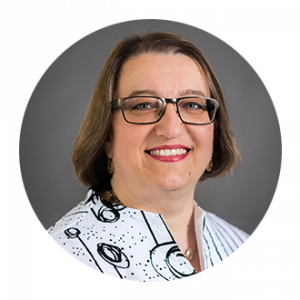Director’s Message

Elizabeth Saewyc, PhD, RN, FSAHM, FCAHS, FAAN Director and Professor
When the editorial team began planning this issue of Touchpoints, the pandemic was in the early days of the emergency, and we were busy coordinating our response to it. We assumed that this issue would be dedicated to the crisis, underscoring the importance of nurses and their recommendations, especially in public health and long-term care.
Indeed, the school’s response to the COVID-19 crisis is something to be proud of. We moved staff, faculty, students, and research teams into work-from-home status in a matter of days, and classes resumed online in the space of a single weekend. We worked flexibly with practice placements as some of them were changing to COVID wards so that our students achieved every competency and graduated on time, fully prepared to enter the workforce, where they were—and are—sorely needed. We even managed to carry on with labs and placements at a time when other health care programs at UBC were curtailed. You can read about the process that faculty members undertook to ensure the safety of faculty and students.
On that note, I want to express my deep appreciation for our students. While many nurses are presented with a moment where they must accept caring for a patient when doing so may put them at unknown health risk, some of our students crossed that threshold while entering their final preceptorship, or as new grads. Though it is a situation that can make seasoned professionals pause, our students met the moment with a level of grace and dedication that makes us proud to have been part of their career journeys.
Three of our alumni have reviewed the subject of their own career journeys, attesting to the richness and variety of options a nursing education can offer: from leadership roles within the health authorities to tackling epidemic disease in Africa, to seeking additional degrees in order to better advocate for patient rights. We are so pleased that in addition to acquiring the complex clinical skills necessary for optimal patient care, our graduates are astute problem-solvers, confident leaders, and outspoken activists, prepared for any direction their career may take them.
And that brings us back to our theme. We thought we had a very strong subject in mind—a theme of historical significance and one that resonates with the importance of nursing. However, as our magazine was taking shape, yet another young Black man died needlessly at the hands of police; this time, voices were raised around the world and protests erupted against systemic racism everywhere. We knew that this, too, is an historic moment with a global impact. The focus of our magazine shifted and an additional theme emerged. In these pages, you will see that we are working to identify and change the systemic racism that affects our profession and our universities, including in our School, in our teaching, in our policies and structures, our history, even hallway displays. We are focusing on our commitment to Truth and Reconciliation. We are re-envisioning the way we educate, from the wording and concepts presented in our textbooks to greater diversity in hiring and appointing our leaders. These are only the next few steps of a long journey, but we have begun with statements on racism and the launch of a School Anti-Racism Task Force. Neda Hamzavi is one of our Master’s students who has a particular interest in the Eurocentrism that pervades nursing. Her perspective and important thesis work are summarized here. And the co-chairs of our Indigenous Cultural Safety Strategic Initiatives committee have invited several friends of the school to join an Indigenous Advisory Circle to assist in developing and amending curricula, policies, and systems to reflect our renewed commitments.
If nothing else in these last several months, we have learned to be nimble, open, and flexible, accepting change in whatever form it comes. We hope you are as inspired as we have been by the opportunity before us, not to return to the pre-pandemic ways we were, but to forge a “new normal.”